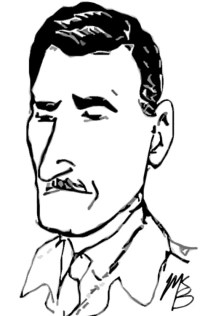Lieutenant-Colonel Jock Runcie
Queen’s Own Cameron Highlanders

The officers discussed whether to fight to the last man and the last round, or to surrender in order to prevent further loss of life; and as it seemed clear that no further damage could be done to the enemy it was unanimously decided to surrender … “we chucked our weapons down and called it a day.”
(C.P. Stacey interview Runcie, 11 Dec 1942)
Born on 28 September 1907 in Cullen, Aberdeenshire, Scotland, John “Jock Runcie worked for the Hudson’s Bay Company in Winnipeg. As captain in the Queen’s Own Cameron Highlanders of Canada, he served as “D” Company commander during the Dieppe Raid of 19 August 1942. He landed alongside Lieutenant-Colonel Alf Gostling, who was immediately killed on stepping ashore. Left behind on the beach after the evacuation, Runcie made a final stand with Lieutenant-Colonel Charles Merritt of the South Saskatchewan Regiment before being forced to surrender. “All around, it was quite a show,” Runcie said.
“When the boats disappeared heading for England you can imagine the sort of jolt it was to those still on the beach,” Runcie described in the aftermath of the raid. “However, the men who stayed behind knew what the situation was. They knew with the Germans closing in and fierce gun fire coming down from the headlands that if any of the ships had come back they would have gone to the bottom. The boys accepted it without a murmur.”
While the captured Canadian troops were sent to the prisoner-of-war camp, Runcie feigned illness and managed to be admitted to a French civilian hospital in Paris. On the night of 5 September 1942, he escaped through a window, and with the help of a resistance fighter and a French family lived for ten days in Paris. He then travelled from Paris through occupied France, evading German patrols, navigating difficult forested terrain, and enduring extreme hungry and thirst. On two occasions somehow he managed lifts on German army trucks
Without linking up with any escape route networks, he made the trek in under two months. He crossed the border with Spain in late November 1942 and presented himself to the local British consulate. By December, he had completed the journey from Gibraltar back to England. Although he received the Military Cross for his heroism, press reporting on his sudden reappearance was muted due to censorship restrictions on the stories of escapees. Runcie rejoined the Camerons and returned with them to France as major and senior company commander in early July 1944.
Following the wounding of Lieutenant-Colonel Norman Ross on 22 July, Runcie took over the Camerons as second-in-command Major Bill Ferguson had been assigned to replace the dead brigade major at 6th Infantry Brigade. A sergeant approved of the promotion, calling Runcie “a great chap and doing a great job. However, he would be wounded in a night attack on 7 August. Ferguson was assigned back to the Camerons only to be killed within hours of taking command.
In addition to the M.C., Runcie also received the Bronze Star from the US Army. A public relations executive after the war, he died in Montreal 20 January 1968.